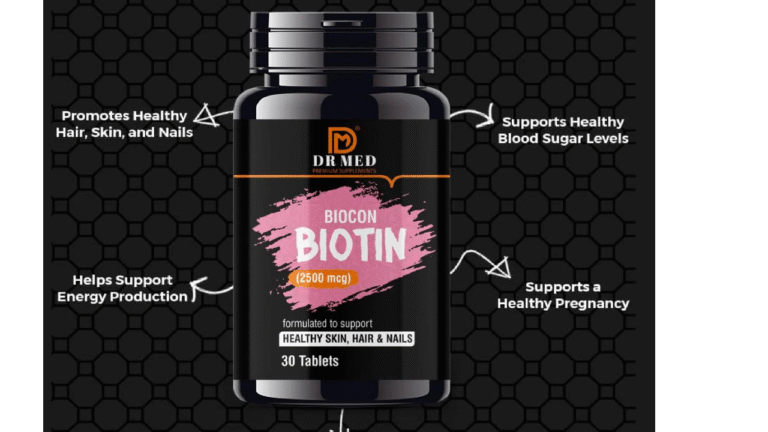Let’s be real: we all want that glowing skin, luscious hair, and unbreakable nails. And if you’ve been on the hunt for a little magic in a bottle, you’ve probably stumbled across biotin tablets more than once. But what’s the real deal with this supplement? Is it actually worth the hype? Let’s break it all down in this no-fluff, all-facts guide.
What Is Biotin, Anyway?
The Science Behind Biotin
Biotin, also known as Vitamin B7, is a water-soluble vitamin that plays a crucial role in helping our body convert food into energy. It’s part of the B-complex vitamins, the same family that powers up your body’s metabolism.
Why Our Bodies Love Biotin
Your hair, skin, and nails are basically obsessed with biotin. Why? Because it helps produce keratin, a basic protein that forms these tissues. Without enough biotin, things start falling apart—literally (hello, brittle nails and hair loss!).
Biotin Tablets – What’s All the Hype?
How They Work
Biotin tablets give your body an extra boost of this essential vitamin. They’re especially handy when your diet falls short or when your body has trouble absorbing nutrients properly.
Different Forms of Biotin Supplements
Not all supplements are created equal. You’ll find biotin in:
-
Tablets
-
Capsules
-
Gummies
-
Powders
-
Liquids
But tablets are often the go-to because they’re convenient, shelf-stable, and easy to dose.
Top Benefits of Taking Biotin Tablets
Healthier, Shinier Hair
One of the biggest claims? Faster hair growth and less shedding. Biotin strengthens hair follicles and improves keratin infrastructure, making your locks shinier and less prone to breakage.
Stronger Nails That Don’t Break
Constantly battling weak, splitting nails? Biotin can help! Studies show that regular biotin intake can significantly improve nail thickness and reduce brittleness.
Glowing, Clearer Skin
Although biotin’s effect on skin is more subtle, many users report smoother texture and fewer breakouts. It supports fatty acid metabolism, which is crucial for skin health.
Are You Getting Enough Biotin?
Common Signs of Deficiency
Even though a biotin deficiency is rare, it can still happen. Watch out for:
-
Hair thinning or hair loss
-
Skin rashes (especially around the nose and mouth)
-
Brittle nails
-
Fatigue and mood swings
Who’s Most at Risk?
Certain groups are more likely to run low on biotin, such as:
-
Pregnant or breastfeeding women
-
Smokers
-
Heavy drinkers
-
People with digestive disorders like Crohn’s or IBS
How to Choose the Right Biotin Tablet
Dosage Matters – But How Much?
Most adults need 30–100 micrograms (mcg) of biotin daily, but supplements often offer doses between 1,000 and 10,000 mcg. Sound like overkill? Not necessarily—biotin is water-soluble, so your body flushes out what it doesn’t use.
What to Look for on the Label
-
Third-party tested: ensures purity and potency
-
Non-GMO and gluten-free: ideal for sensitive stomachs
-
No artificial additives: keep it clean and simple
Are There Any Side Effects?
The Truth About Overdosing
Good news: biotin toxicity is extremely rare. But taking mega doses can sometimes throw off lab tests (like thyroid or hormone panels), so always let your doctor know if you’re supplementing.
Possible Interactions
Biotin might mess with some meds, especially anti-seizure drugs and antibiotics. If you’re on long-term prescriptions, check in with your healthcare provider.
Natural Sources vs Supplements – Which Wins?
Biotin-Rich Foods
Before you pop a tablet, try including more of these in your diet:
-
Eggs (especially the yolks)
-
Nuts and seeds
-
Salmon
-
Sweet potatoes
-
Spinach
-
Bananas
Why Tablets Might Still Be Better
Here’s the thing—cooking and food processing can destroy biotin. Plus, if you’re trying to target specific issues like hair loss, supplements provide a more reliable and concentrated dose.
Real People, Real Stories
Before and After Results
Scroll through any review site, and you’ll see thousands of “before and after” photos. While everyone’s experience varies, many users notice:
-
Less shedding in 4–6 weeks
-
Nail strength in 3–4 weeks
-
Skin improvements after 2 months
How Long Does It Take to See Results?
Let’s not kid ourselves—biotin isn’t a miracle overnight fix. On average, expect to see results within 30 to 90 days of consistent use. Patience pays off!
Tips for Maximizing Biotin Benefits
-
Take your tablet with food to boost absorption.
-
Combine with other vitamins like zinc, collagen, and vitamin E.
-
Stay hydrated—biotin works best when your body is in top shape.
Final Thoughts
Biotin tablets are one of those rare supplements that actually live up to the hype—for many people, at least. If you’re dealing with breakage, thinning hair, or weak nails, adding biotin to your routine might be the glow-up you’ve been waiting for.
Just remember: supplements aren’t a shortcut to health. Pair them with good nutrition, sleep, and hydration for the best results. And if something feels off? Talk to your doc.
FAQs About Biotin Tablets
1. Can I take biotin tablets every day?
Yes! Daily use is common and generally safe since it’s water-soluble. Just stick to the recommended dose.
2. Are biotin tablets safe during pregnancy?
In most cases, yes—but always get the green light from your doctor, especially when pregnant or breastfeeding.
3. Can men take biotin tablets too?
Absolutely. Biotin works the same regardless of gender—great for hair, skin, and nail health in everyone.
4. Will biotin help with hair regrowth in bald spots?
Biotin supports growth where follicles are active. If the follicle is dormant or scarred, biotin may not help.
5. Is 10,000 mcg of biotin too much?
It’s a high dose, but still considered safe. However, some people see results with much lower doses—so don’t overdo it unless advised.

